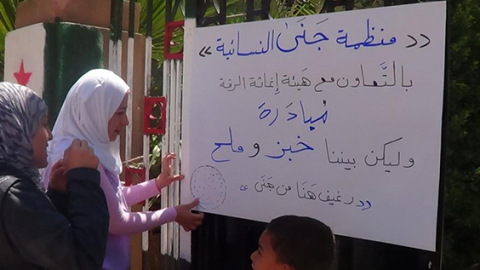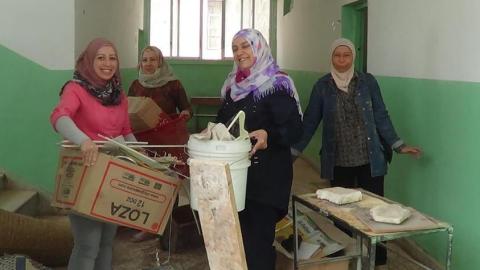Soon after the regime forces retreated from Raqqa, a group of ten women, carrying the “dreams of hopes of women of Raqqa”, gathered to start a new civil society group: Jana. The women’s main aim was to assert their role in rebuilding their society and to take their rightful place next to the men in the Syrian revolution.
“Religion is a personal matter”
Their struggles, which they insist are with the authoritarian mentality regardless of which shape it takes, have been complex and multi-faceted. Their headquarters, formerly a hospital for children with diabetes that was bombed by regime forces, was only acquired after a month-long sit-in in March 2012 against the Ahrar al-Sham Islamist group who took control of it. The women, who are all religious, have stood up to a great deal of pressure to turn their movement into an Islamic one. This refusal, according to one of the founders, was due to their deep belief that, despite their own religiosity, “religion is a very personal matter, and no one has the right to force it on other people.”

The group had little support other than their deep convictions and their personal efforts. Their activities focused on serving their communities through humanitarian and community development efforts. They adapt their work to the dominant conditions and needs of their community. Their “Let There Be Bread Between Us” campaign was a response to the bread shortages in town where they made Arabic bread and distributed it freely. They have also made a point of asserting their role among other civil society projects through their participation in collaborative projects like “I Won’t Leave My School” and “Let’s Share Our Medicines”.
Huge work, small resources
The organization tries, in determining their priorities, to balance the resources at hand with the needs of their community. In response to the deteriorating economic level for many families, due to rising prices and withheld salaries, the group founded two small businesses that offer employment for women (making foodstuffs and sewing). The workshops were funded through a grant and cooperation agreement with a norwegian aid agency. The proceeds from the two projects helped fund the group’s other activities like the rehabilitation of the Muawiyah High School and the Crafts of the Revolution Exhibition.

The main obstacle identified by the group is their lack of funding whereby they have to resort to their small personal incomes to support their projects, which limits their activity. They also cite the passivity and lack of participation from other women in town. This, they partly attribute, to their fear from the dominant militias in the town, as well as the prospects that the regime might come back. Nevertheless, the group is determined to tackle this issue with more “awareness, and training campaigns so that women can take their rightful place in society.”
Their meager resources, coupled with their strict refusal for conditional funding, means the group often finds itself unable to fund some projects. Nevertheless, what they lack in resources they make up for in determination and in the clarity of their objectives: “for women to stand side by side with men in creating a country for all Syrians."



